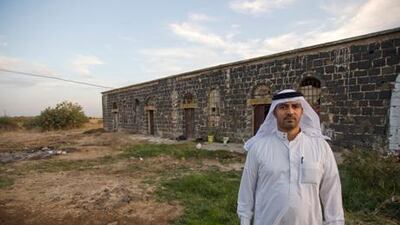HAMREET // For decades, the Nu'eim tribe has lived in the shadow of war, its main village of Hamreet lying just a few kilometres from the ceasefire line dividing the Syrian-controlled territory from the Israeli-occupied Golan Heights.
Heavily dependent on farming and sheep rearing, Nu'eim shepherds continue to fall victim to the decades-long conflict. One or two shepherds a year tread on forgotten, but still deadly, landmines or unexploded shells as they graze their flocks.
Some 20 villages, once home to members of the Nu'eim, remain out of bounds, lost on the other side of the de-facto border established after Israel's seizure of the land in 1967, and its subsequent illegal annexation after the 1973 war.
While the intractable conflict between Damascus and Tel Aviv has not ended, the Syrian-controlled Golan is beginning to shed its military hinterland persona, as a growing population, rich natural environment and new investment plans usher in prospects of modern development.
The Golan, about 60km south-east of Damascus, was once an area from which people emigrated in the face of violence or in search of job opportunities. According to local residents and officials, however, it is now attracting newcomers seeking to escape the urban sprawl of Syria's nearby capital.
"There is now immigration to the Golan from the cities. It used to be the other way round, but today more and more people want to live out here," said Omar Mohammad Tahan, the municipal leader of Qodana and Na'ema, an administrative district in the Golan.
Four years ago, construction work started on a new road, known as the Peace Highway, linking the Golan directly to Damascus. When complete, it will cut some 40km off the current serpentine network of bumpy minor streets that join the two places.
While the highway has not been finished, it has already begun to transform the area, fuelling a rise in land prices as developers anticipate increasing demand for properties, leisure facilities and infrastructure. A major military checkpoint has also been removed from the entrance to the Golan, substantially easing access for residents and visitors.
"We expect the road to encourage investment and to make it more attractive for people to live here - it's an important project, it will bring us closer to Damascus," Mr Tahan said.
The Syrian government is struggling to encourage modernisation in outlying regions as part of its anti-poverty strategy, and to prevent further uncontrolled growth of the country's major cities, principally Damascus and Aleppo, which continue to expand as migrants come in search of work.
The substantial rise in land prices has not deterred wealthier families from Damascus looking to build summer homes in the Golan region, and the opening of new colleges and governmental administration offices have meant the young are no longer forced to leave in order to further their education or find jobs.
Tax breaks on imports and the promise of streamlined bureaucracy are an added incentive for private firms to locate in the Golan, although the impact has so far been limited. Joblessness, in particular, remains a major problem.
"We still have a high rate of unemployment and there is really only work in farming or in government departments," said Saleh al Nu'eimi, a lawyer and leading member of the Nu'eim tribe. "There has been no big investment yet but we are beginning to see interest from Lebanon and Qatar, and Iranian businessmen were here recently and they want to establish a dairy produce factory."
Much of western Syria has been identified as prime renewable energy land and, with its strong and consistent prevailing winds, the Golan is no exception.
"There are plans to set up renewable wind power farms here," said Mr al Nu'eimi. "Wind power will be a big hope for the future."
Renewable energy will play an increasing role as Syria moves to plug a deficit in electricity production that already results in regular power cuts, although the Golan itself enjoys an uninterrupted supply as a matter of government policy. Even well-to-do areas of Damascus are not so fortunate.
Another arena in which the Golan enjoys natural advantages over the rest of the country is in water supply. While Syria's impoverished eastern Jazeera has endured four years of crippling drought, farmers in the Golan are more likely to suffer from rain damage to crops from the heavy winter downpours.
The various new developments have been broadly welcomed by residents with those owning land, in particular, content to see the value of their holdings soar. But that same inflation has had an adverse effect on some of the displaced Golanese who moved to Damascus after the 1967 or 1973 wars.
"In the past six or seven years, land prices have increased so much and I can't afford to buy anything here," said Mohammad al Rifaey, a resident of Blackstone, a working-class Damascus suburb. His family is from the occupied Golan Heights and had planned on moving back to the Syrian-controlled zone, until soaring land price rises made it impossible.
A plot that cost $1,500 (Dh5,500) less than a decade ago may now sell for more than $13,000, far out of reach of most ordinary Syrians.
"If you've benefited from the price rises, you're happy, but those too poor to own land are not," said Hussein Dubak, a school principal in the Golan's Ayn al Nouria district. "The poor who want to come back to live here, not who are from here, cannot always return."
And then there is the on-going problem of Syria's conflict with Israel. There have been peace talks, and hopes of peace, but never peace itself.
"Because of the Israeli occupation, because of living near the border, we live with instability. You can expect to lose everything at a moment's notice," said Mr Tahan, the municipal council chief. "When the media is full of news about a peace process, people want to come back here and investors are interested in coming. When there is talk of war, the opposite happens."

